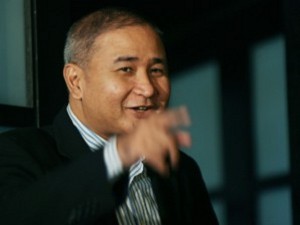MANILA, Philippines—The head of Philippine Amusement and Gaming Corp. (Pagcor) on Friday strongly denied “reckless allegations” by a US-based gaming giant that he was bribed by a Japanese tycoon seeking to build a rival casino in Metro Manila and that the local gaming industry was tainted with corruption.
Pagcor chair and CEO Cristino Naguiat Jr. issued the denial after casino operator Wynn Resorts sued its former partner, Kazuo Okada, in a Las Vegas court, accusing Okada of bribing Philippine gaming officials with free accommodations in a $6,000-a-night Macau hotel and a pricey Chanel bag for Naguiat’s wife.
“The facts are that a group of Pagcor officials and I, with the approval of Pagcor’s board, visited Macau in September 2010 to meet with key gaming industry players and examine their operations,” Naguiat said. “The then vice chairman of Wynn Resorts, Mr. Okada, invited the group to meet with executives of Wynn Macau and stay at their resort in VIP quarters, compliments of Wynn Macau.”
He said he only learned from media reports about a supposed $20,000 in cash from Wynn Macau credited to his room. Later inquiries by Pagcor revealed that the advance was drawn by Masato Araki, a business associate of Okada’s at the time.
Chanel bag
“I found out about the reported $5,000 credit allocation from the Freeh report,” Naguiat added. “The Pagcor delegation was never aware of any such allotment, nor was any offer or request made during the trip.”
“The much commented upon Chanel bag was left in my room as a gift and, on seeing it, I had immediately returned it,” he added. The Freeh report had pointed out that Okada’s assistant, upon returning the bag, said this was because Naguiat’s wife did not like the bag so he would give it to his own wife, instead.
“The reported $1,673 dinner that was paid for by Wynn Macau included not just the Pagcor delegation but a number of business associates of Okada who were meeting with Pagcor at the time,” Naguiat said.
“I know nothing about the reported $110,000 in payments supposedly made to Philippine regulators since 2008 and certainly did not receive any such payments.”
Naguiat’s denial coincided with a decision by Wynn Macau casino to oust Okada as a director over what it called “unacceptable conduct” involving alleged corruption in the Philippines.
Deeply ingrained corruption
In their court filing, Wynn officials presented the results of a third-party investigation it commissioned in January 2011, which described the Philippine gaming industry as characterized by “deeply ingrained” official corruption.
The report was prepared by former Federal Bureau of Investigation (FBI) director Louis Freeh.
The report expressed “doubts that newly elected President Benigno Aquino III’s stated plans for reform would eliminate corruption from the gaming industry.”
The findings came after a heated boardroom battle between Wynn founder Steve Wynn and Okada, his former partner and a pachinko tycoon, with Wynn accusing the Japanese businessman of violations of the US Foreign Corrupt Practices Act. The law prohibits bribery by US firms operating anywhere in the world.
The Freeh report noted that the Philippines’ legal and regulatory frameworks “are not closely aligned with American compliance and transparency standards.”
These differences were underlined by Wynn’s insistence in its complaint in the Las Vegas court that Okada—then the company’s vice chair—had bribed Naguiat and his predecessor, Efraim Genuino, in order to further the Japanese businessman’s interests in Pagcor’s $4-billion Entertainment City project.
Naguiat and Malacañang maintain that the complimentary stay Naguiat and his family enjoyed in Wynn Macau’s 7,000-square-foot villa is standard practice in the gaming and hospitality industries. (See story on this page.). Genuino has also denied claims that he was bribed.
The Freeh report also raised questions about the acquisition of land on a reclaimed area of Manila Bay for the development of Okada’s casino Tiger Entertainment (formerly known as Aruze Corp.), suggesting Okada may have violated Philippine constitutional limits on foreign ownership of land—capped at 40 percent—through layers of proxies.
Politically motivated
In his statement on Friday, Naguiat denied the allegations against him “in the strongest possible terms.” He described the entire controversy as a “business dispute into which I have been dragged.”
“The recent allegations against me are outrageous, politically motivated and untrue,” he said.
